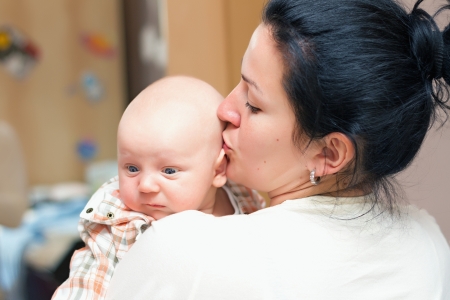Understanding Common Pregnancy Complications
Pregnancy is an exciting and transformative time, but it can also bring unexpected challenges. In the UK, certain pregnancy complications are more common than many expectant parents realise. Recognising the signs early and knowing when to seek help can make a significant difference. Some of the most frequently encountered complications include pre-eclampsia, gestational diabetes, premature labour, and issues such as reduced fetal movement or bleeding. Signs like persistent headaches, severe swelling, unusual pain, or changes in your baby’s movements should never be ignored. The NHS provides clear guidelines on what symptoms require immediate attention versus those that can be discussed at your next antenatal appointment. It’s important to remember that no concern is too small—midwives and doctors are there to support you through every stage of your pregnancy journey in the UK.
2. How the NHS Responds to Pregnancy Emergencies
When pregnancy complications arise, the NHS acts swiftly to provide immediate care and reassurance for both mother and baby. Understanding what happens in these situations can help families feel more prepared and supported. Here’s a closer look at the typical steps taken by NHS staff during emergencies, and what you can expect at local NHS facilities.
Immediate Steps Taken by NHS Staff
| Step | Description |
|---|---|
| Triage Assessment | A midwife or nurse will quickly assess your symptoms, take vital signs, and determine urgency. |
| Consultation with Specialists | If necessary, an obstetrician will be called to review your case immediately. |
| Monitoring | Continuous monitoring of mum’s vitals and baby’s heartbeat (CTG) may be started. |
| Diagnostic Tests | Blood tests, urine samples, and ultrasounds are often performed on-site to identify complications. |
| Treatment Plan | The clinical team creates a tailored plan—this could include medication, further monitoring, or an emergency procedure if needed. |
What to Expect at NHS Facilities
- 24/7 access: Most hospitals have maternity triage units open round-the-clock for urgent concerns.
- Family-centred approach: NHS staff encourage partners or birth supporters to be present whenever possible for emotional support.
- Clear communication: You’ll receive regular updates about your condition and next steps, with plenty of opportunities to ask questions.
Your Role During Emergencies
- Share all symptoms honestly, even if they seem minor—it helps the staff make the best decisions.
- Bring your maternity notes if you have them; this speeds up your care process.
The NHS Promise
The NHS is committed to ensuring every family receives compassionate, evidence-based care during unexpected pregnancy complications. By understanding the emergency response process, you can feel more confident and supported should challenges arise on your pregnancy journey.
![]()
3. Support Services Available through the NHS
When pregnancy complications arise, families in the UK can rely on a wide range of support services provided by the NHS. Understanding these resources can make a significant difference during unexpected and often worrying situations. Here’s a friendly guide to help you navigate the available options and know who is there to support you every step of the way.
Maternity Units: Your First Point of Contact
Maternity units in NHS hospitals are well-prepared to manage various complications, from early pregnancy concerns to emergency situations later on. These units operate around the clock, offering immediate assessment and care for both mum and baby. Many hospitals also have triage phone lines, so if you’re unsure about your symptoms or need advice, don’t hesitate to ring up for guidance before heading in.
Specialist Clinics: Tailored Care for Complex Needs
If your pregnancy requires more specialised attention, NHS hospitals often provide access to specialist clinics such as fetal medicine units, recurrent miscarriage clinics, and preterm birth prevention clinics. Here, multidisciplinary teams—including consultant obstetricians, midwives, and sonographers—work together to offer tailored monitoring and treatment plans based on your individual needs.
Support Teams: Emotional and Practical Help
Navigating pregnancy complications can be an emotional rollercoaster. The NHS recognises this and has dedicated support teams in place. Specialist midwives and perinatal mental health teams are available for one-to-one conversations, while family support workers can help with practical issues like transport or accessing benefits. If you need extra reassurance or someone to talk to, don’t be shy—these caring professionals are ready to listen.
Community-Based Support
Beyond hospital care, local community midwives continue supporting families at home or in children’s centres. They can visit you after a hospital stay or if mobility is an issue, ensuring that follow-up care is convenient and accessible.
Charity Partnerships
The NHS often collaborates with UK charities such as Tommy’s, Sands, and Bliss to extend additional support for families facing loss or neonatal complications. These organisations offer helplines, peer groups, and helpful resources—ask your NHS team for recommendations tailored to your situation.
Knowing where to turn can ease some of the anxiety that comes with unexpected pregnancy challenges. The NHS aims to walk beside you throughout this journey, providing both medical expertise and compassionate support whenever you need it most.
4. Accessing Mental Health and Emotional Wellbeing Support
When pregnancy complications arise, emotional wellbeing is just as important as physical health. The NHS recognises the impact of unexpected situations on both parents and families, providing a range of mental health and emotional support services tailored to your needs. Understanding what help is available – and how to access it – can make a significant difference in coping with stress, anxiety, or low mood during this challenging time.
Counselling and Talking Therapies
If you find yourself feeling overwhelmed, anxious, or depressed during or after pregnancy complications, the NHS offers access to professional counselling and talking therapies. These services are provided by trained counsellors who understand perinatal mental health issues. You can self-refer to many local NHS talking therapy services through the NHS website, or your GP, midwife, or health visitor can refer you directly.
Perinatal Mental Health Teams
The NHS has dedicated perinatal mental health teams across the UK that specialise in supporting mothers (and their partners) experiencing moderate to severe mental health difficulties related to pregnancy, childbirth, or early parenthood. These teams include psychiatrists, psychologists, nurses, and social workers who work together to provide holistic care tailored to your unique situation.
| Service | How to Access | What They Offer |
|---|---|---|
| Counsellors/Talking Therapies | Self-referral via NHS website or GP/midwife referral | One-to-one sessions, group therapy, CBT, stress management |
| Perinatal Mental Health Teams | Referral from GP, midwife or health visitor | Assessment, treatment plans, psychiatric support, family involvement |
| Local Support Groups | NHS recommendations or community listings | Peer support, shared experiences, practical advice for parents/carers |
Community Support: Local Groups and Charities
In addition to clinical services, many parents find comfort in joining local support groups recommended by the NHS. These groups offer a safe space for sharing experiences with others who have faced similar challenges. Some are run by charities such as Mind UK or PANDAS Foundation (supporting families affected by perinatal mental illness), while others may be organised at your local children’s centre or through online communities. Your midwife or GP can suggest groups that suit your personal circumstances.
Tips for Seeking Support:
- If you feel something isn’t right emotionally, speak up early – your feelings are valid and help is available.
- Your partner or family members can also access some services for their own wellbeing.
- You do not have to go through this alone; seeking support is a strength, not a weakness.
- If urgent help is needed (e.g., thoughts of self-harm), contact your GP out of hours service or call 111 for immediate advice.
Together We Can Nurture Emotional Resilience
The journey through unexpected pregnancy complications can be daunting. By connecting with the right resources – counsellors, perinatal teams, and peer groups – you gain not just support but also new ways to foster resilience for yourself and your growing family.
5. Practical Tips for Parents Facing Unexpected Situations
Strategies for Navigating Pregnancy Complications
Facing unexpected pregnancy complications can feel overwhelming, but having a plan in place can make a significant difference. Start by keeping a dedicated folder or notebook with all your medical notes, appointments, and questions for your midwife or consultant. This helps you stay organised and ensures nothing important slips through the cracks during stressful moments.
Effective Communication with Healthcare Professionals
Clear communication is key when dealing with NHS staff during pregnancy complications. Don’t hesitate to ask questions—no matter how small they may seem. If you’re unsure about something, repeat it back in your own words to confirm your understanding. Bringing a partner, family member, or trusted friend to appointments can also help you remember details and provide emotional support.
Local Helplines and Support Networks
The NHS offers various helplines that can connect you to immediate advice and support. You can contact NHS 111 for non-emergency medical queries or seek guidance from your local maternity unit’s triage line. Many areas have specific perinatal mental health teams who are there to help if you’re feeling anxious or low.
Online Resources for Information and Reassurance
If you need information outside of regular hours, the NHS website is a trusted source for up-to-date advice on pregnancy complications. Charities such as Tommy’s and Sands UK also offer excellent guidance and helplines for parents facing difficult situations.
Self-Care and Community Support
Remember that looking after your wellbeing matters just as much as attending medical appointments. Join local antenatal groups or online forums where you can share experiences and tips with other parents going through similar challenges. Never be afraid to reach out—your local GP, health visitor, or community midwife can direct you towards additional resources if needed.
6. Your Rights and Choices within the NHS Framework
When facing pregnancy complications, understanding your rights and options within the NHS is key to feeling empowered and supported during a stressful time. The NHS is committed to providing patient-centred care across the UK, ensuring that you are informed, respected, and able to make choices about your own health journey.
Your Rights as an NHS Patient
As an expectant parent experiencing unexpected pregnancy challenges, you have several important rights under the NHS Constitution. These include the right to access free care at the point of delivery, the right to be treated with dignity and respect, and the right to clear information about your condition and treatment options. You can also request a second opinion if you are unsure about your diagnosis or care plan.
Making Informed Decisions
Informed consent is a cornerstone of NHS maternity care. This means you should be given all necessary information in a way that is easy to understand, including details about potential treatments, risks, benefits, and alternatives. Don’t hesitate to ask questions or request more explanation—your healthcare team is there to support your decision-making process.
Advocacy and Support Services
If you need extra help understanding your rights or communicating your wishes, advocacy services are available throughout the UK. Organisations such as PALS (Patient Advice and Liaison Service) can guide you through the NHS system, help resolve concerns, and ensure your voice is heard. Additionally, charities like Birthrights and Maternity Action provide guidance on legal rights and support for families facing complex pregnancy situations.
Remember: you are not alone in navigating pregnancy complications. The NHS framework is designed to protect your choices while offering robust support networks for every step of your journey—from early concerns to postnatal care. By knowing your rights and seeking out advocacy when needed, you can actively participate in decisions about your care and well-being.

